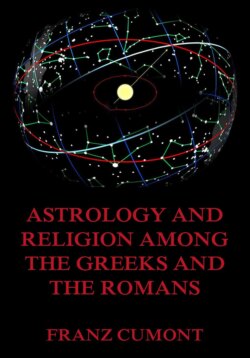Astrology And Religion Among The Greeks And Romans

Реклама. ООО «ЛитРес», ИНН: 7719571260.
Оглавление
Franz Cumont. Astrology And Religion Among The Greeks And Romans
Astrology And Religion Among The Greeks And Romans. PREFACE
INTRODUCTION
LECTURE I. The Chaldeans
LECTURE II. Babylon and Greece
LECTURE III. The Dissemination in the West
LECTURE IV. Theology
LECTURE V. Astral Mysticism --Ethics and Cult
LECTURE VI. Eschatology
Отрывок из книги
It is the purpose of these lectures delivered under the auspices of the American Committee for Lectures on the History of Religions, to sum up the results of researches carried on by me for many years in the field of ancient astrology and astral religion. For some facts set forth here in a summary fashion, I can refer the reader interested in the details to a number of special articles published in various periodicals; the proof of other assertions will be given in a larger work that I hope at some future date to publish on this same general theme.
My sincere thanks are due to Mr. J. B. Baker of Oxford who has carried out the task of translating these lectures in so satisfactory a manner; and I am also largely indebted to my friend, Mr. J. G. C. Anderson of Christ Church, who was kind enough to undertake the revision of the manuscript. I also owe some valuable corrections to Prof. Morris Jastrow, Jr., of the University of Pennsylvania, who, as Secretary of the American Committee, may be said to have called this book into existence, and to whom I take pleasure in dedicating the volume, as a mark of recognition of his own researches in the cognate field of Babylonian-Assyrian astrology.
.....
The purely empirical and very simple determinations, accompanied by predictions, which have been preserved to us, are naive and almost puerile: even in the time of the Sargonides there is nothing in them which recalls the learned precision of a Greek horoscope. But from this mass of documents, laboriously collected in the archives of the temples, the laws of the movements of the heavenly bodies were disengaged with increasing precision. Primitive man commonly believes that new stars are produced each time they disappear, that the sun dies and is born each day or at least each winter, that the moon is swallowed up during eclipses, and that another takes its place. To these early ideas, all vestiges of which did not disappear, nay, have not disappeared--we speak still of a "new moon"--there succeeded the discovery that the same stars always traversed the upper spheres with a brightness which increased and diminished by turns. With the irregularity of atmospheric disturbances was necessarily contrasted the regularity of side-real revolutions and occultations. Little by little the priestly astronomers, as we have seen, succeeded in constructing an astronomical calendar and foretelling the return, at a fixed date, of phenomena previously described, and they were able to predict to the astonished crowds the arrival of the eclipses which terrified them. There is nothing surprising in the fact that, as they ascribed to the heaven itself the revelation of this marvellous knowledge, they should have seen in astronomy a divine science.
It is impossible to exaggerate the religious importance which an eminently superstitious people attached to these discoveries. Schiaparelli, a most competent historian of the exact sciences in antiquity, has remarked that "the tendency which dominates the whole Babylonian astronomy is to discover all that is periodic in celestial phenomena, and to reduce it to a numerical expression in such a manner as to be able to predict its repetition in the future." The scientific discoveries which were made from the Assyrian period onwards enabled astrologers, as we have seen, to foresee certain events with an absolute certainty which no other kind of prognostication attained. An endless perspective reaching far into the future was opened to minds astonished at their own audacity. Divination by means of the stars was thus elevated above all other methods which were in contemporary use. It is beyond doubt that the pre-eminence henceforth assigned to astrology was bound to lead to a transformation of the whole of theology. "The science of the observation of the heavens, which had been perfected little by little by the priests, became in their hands a body of astral doctrine, which never lost the flavour of the school, but which nevertheless permeated the entire Babylonian religion, and at least in part transformed it."
.....